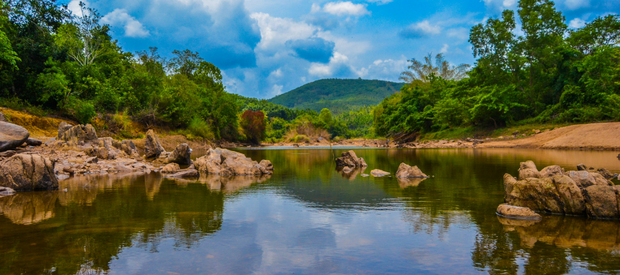The Rights of Rivers
The Universal Declaration of the Rights of Rivers
Background
Our rivers don't stop at borders, and many of our rivers, aquifers and freshwater resources are shared between nation states. Yet the vast majority of our shared rivers still lack agreements around management and governance at a basin scale.
Only a few shared water resources are governed by agreements between states. The Danube, the Mekong and the Nile are all governed by some sort of international agreement or treaty, but these agreements suffer from significant gaps and weaknesses, such as not including all riparian states, or being limited in their mandate and scope vis-a-vis today's water challenges. Many lack clarity or real teeth in how they guide decision-making on the use of waters, or on developments and infratsructure that affect the quality and quantity of water, or its equitable use between states.
In 1997, a hundred of the world's governments adopted the United Nations Convention on the Law of the Non-Navigational Uses of International Water Courses, and in 2014 it entered into force when Vietnam signed as the 35th member. This framework convention is a critical piece of the global architecture to recognise the value of shared rivers,
The Declaration in Actionand provides important guidance on their protections. Yet because so few states have ratified it, its value remains largely unrealized.
The Earth Law Center, based in New York City, is working to transform the law to “recognize and protect nature’s inherent rights to exist, thrive and evolve.” To this end, the organization has drafted a Universal Declaration of River Rights – an international document that defines the basic rights to which all waterways are entitled, as determined by both international legal precedent and ecological principles of river health.
This declaration has already been used as the basis for a law in Mexico City. In December 2017, the Legislative Assembly of the Federal District included the rights of waterways within the Water Sustainability Law of Mexico City (“Ley de Sustentabilidad Hídrica de la Ciudad de México”). In drafting this key provision, lawmakers adapted parts of the Universal Declaration of the Rights of River. The law now only awaits the final step of publication in the Official Gazette of Mexico City in order to go into effect.
This landmark water law recognizes that rivers, channels and streams possess a right to flow, a right to avoid harmful alterations to ecosystems and biodiversity, a right to be free from contamination, and a right to rescue and rehabilitate important water zones, among others.
River Rights Strategies
Strategies for establishing the rights of rivers include the following:
- Pass a national or regional law that recognizes the rights of all rivers (note that rivers often implicate federal law).
- Pass a law recognizing the rights of a single river (such as New Zealand’s Whanganui River).
- Establish new (or revive old and forgotten) treaty rights between a federal government and an indigenous group that recognize the rights of rivers and the related indigenous rights, including sovereign rights.
- Go to the courts to enforce the rights of rivers – whether by filing a lawsuit (high risk, high reward – with the risk being setting bad precedent if you lose) or amicus brief. The Earth Law Center has a template amicus brief available in multiple jurisdictions on behalf of the rights of rivers. Just as human rights are inherent to our existence, so too do rivers possess inherent rights, as evidenced in Colombia with the Atrato River.
- Pass a generic “rights of nature” law that recognizes the inherent rights of all ecosystems, including rivers and watersheds. Enforce the generic rights of nature law to protect rivers. This is the approach in Ecuador, where the Vilcabamba River was ordered to be restored to health based on its rights under the country’s constitution.
We will continue to update this page with examples of how river defenders are putting the Declaration into practice!
Photo courtesy of Pakistan Fisherfolk Forum.



